Society
'Here We Can Worship Our Gods': Persecuted Pakistani Hindus In Delhi Speak On Citizenship Amendment Act
Swati Goel Sharma
Mar 12, 2024, 11:56 AM | Updated 02:34 PM IST
Save & read from anywhere!
Bookmark stories for easy access on any device or the Swarajya app.
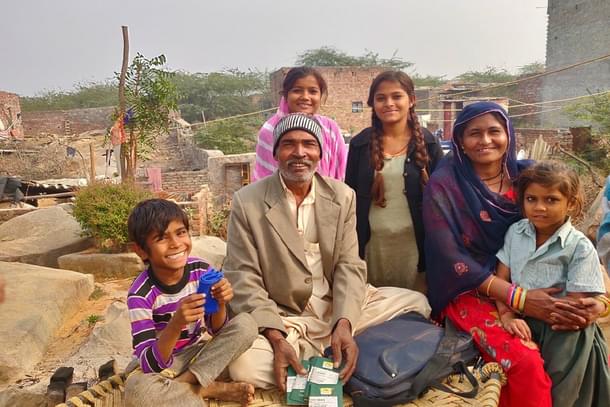
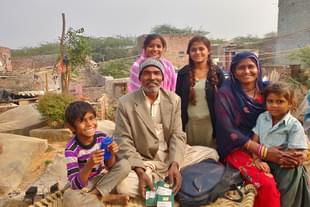
Not too far from the plush farmhouses of South Delhi’s Chattarpur, near the sprawling Asola-Bhatti Wildlife Sanctuary, is Bhati Mines village. Tucked in a corner of this semi-urban settlement near the Delhi-Haryana border is a colony of jhuggis and tents called ‘Pakistani mohalla’.
It was from this colony that a Pakistani girl, Madhu, got admission in the local government school in 2016 after intervention by the then foreign affairs minister Sushma Swaraj. Swaraj took notice of a newspaper report that said the girl was being repeatedly turned away by the school for want of documents.
Madhu was lucky that Swaraj noticed her case. However, the colony has hundreds of children like Madhu who struggle for a school seat as they don’t have the documents demanded by schools – educational certificates from Pakistan and papers that show them to be residents of India.
Her uncle Jevar, who is her guardian (Madhu lost her father before coming to India), told this correspondent at that time that he arrived in 2014 & was staying on a long-term visa (LTV) in India. He said his papers were under consideration for Indian citizenship. He did not have Aadhaar or any such Indian document. He also did not have any documents of Madhu’s schooling in Pakistan.
To accommodate Madhu, the school had to bend many rules.
At that time, Jevar said he had little hope of getting Indian citizenship anytime soon.
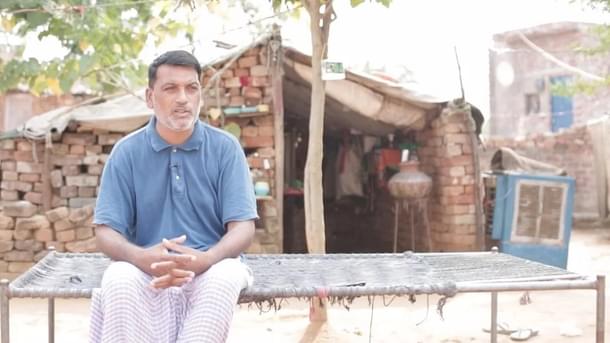
“If those who had migrated here as early as 1990s were struggling for citizenship, what chance did he have?”
Jevar, however, was determined to stay put and wait, ready to make those strenuous trips to government offices for LTV extension year after year. He had already had five such extensions.
Returning to Pakistan was not an option for him. In 2003, his brother was killed by his Muslim neighbours over a petty dispute. Soon after, Jevar applied for Pakistani passport so he could cross-over to India with family, to the “land of Hindus”.
For decades, Hindu migrants from Pakistan to India, who often come fleeing religious persecution, have depended on a series of such LTV extensions in their prolonged struggle for Indian citizenship. It usually takes 14-15 years.
All this could change.
In a historic move, Home Minister Amit Shah tabled the Citizenship (Amendment) Bill, 2019, in the Lok Sabha on 9 December where it passed. On Wednesday, the bill was also approved in the Rajya Sabha. The bill intends to fast-track legal path for citizenship for those people belonging to minority religions (non-Muslims) who have and will come to India fleeing religious persecution in the neighbouring Islamic states of Pakistan, Afghanistan and Bangladesh.
Jevar, and hundreds like him who came on or before 31 December 2014, are now eligible for citizenship without further wait. Those who came in later, may have it after just six years of stay in India as per the bill.
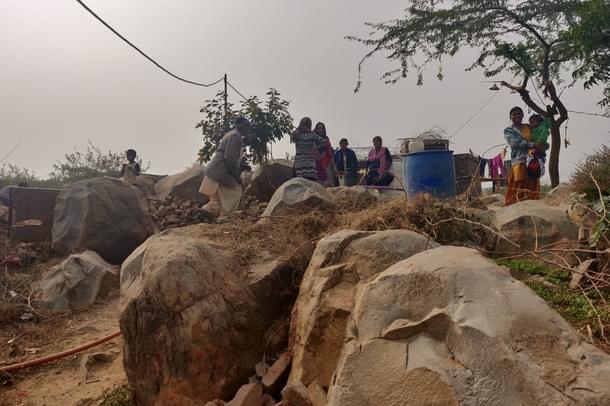
On Wednesday, Jevar told this correspondent that the day was like a festival for him. “Aaj hi mera janmadin, aaj hi meri Holi, aaj hi meri Diwali (today is my birthday, today is my Holi, today is my Diwali),” he said.
When Jevar came to Delhi in 2014, from Sindh province’s Sukkur district, his wife and five children came with him. From his siblings’ families, he could only bring Madhu.
“If I become an Indian citizen, I will make arrangements to bring Madhu’s family here too. Possibly, my sister’s family too,” he said.
“Everybody is unhappy there. They live perpetually in fear.”
“Citizenship will make me eligible for Aadhaar card, ration card and other government facilities. I will be in a position to support my clan,” he said.
Jevar said he had received a phone call from a journalist a few hours ago and thus got to hear and understand the news earlier than others in the colony.
For others, it was business as usual. Men had gone out for work at construction sites; the women were busy with their household chores – storing water and collecting wood for the earthen stove.
They, however, knew that something big had happened, that there was a reason to celebrate. A political party worker who helps them with paperwork and is known as their 'leader', had told them he would be visiting them in the evening with “10 kilos of sweets”. He also told them they should be prepared for dance and songs.
When asked about the bill, Jevar’s neighbour Kesro, who came to the colony in 2015, raised a slogan – “Modi zindabad. Modiji ka shukriya.”
He, however, knew nothing about the bill.
“What you tell us sounds great,” he said, when told. “We are tired of running around. We are tired of making trips to government offices.”

He, and others in the mohalla, may not have grasped what has unfolded in the Indian Parliament, but their stories suggest that it was crucial for them.
Kesro, 50, came to India with family in March 2015 from Umerkot district in Sindh province. Like most Pakistani Hindus, Kesro arrived on a month-long pilgrim’s visa to Haridwar and Mathura and subsequently applied for LTV.
It had become too stressful to live in Pakistan.
“If our sons go out alone, we aren’t sure if they will come back. If our daughters go out alone, we are sure they will not come back,” he said.
Kesro has three sons and four daughters. He married his eldest daughter to a man from his Bhil Rajput community in Rajasthan in 2016. She, however, continues to live with him in Delhi. Like Kesro, she is permitted to stay only in Delhi as per the condition of her current LTV extension that’s valid until April 2021.
Under the amended bill, they would be eligible for citizenship by that time.
“We are happy that India has realised that we have no other option. We can’t go back to Pakistan no matter what. When we were coming here, government officials threatened us with consequences if we don’t come back,” said Kesro.
“They even said our relatives [in Umerkot] would be harmed if we don’t return. Thankfully, they didn’t touch them,” he said.
“We don’t talk to anyone in Pakistan over the phone. Some of our people here who keep going and coming, inform us of their well-being.”
Kesro’s eldest daughter, 23-year-old Imiya Devi, said she studied only till Class V in Umerkot. “Studying after that is not allowed,” she said.
She explained, “if girls study after Class V, go out of the house, Muslim men notice them. They take a liking to them. Then they abduct them.”
“They target Hindu girls,” she said.
Imiya said that soon after she completed her school – when she was 14 – her family decided to move to India. The next step was getting a Pakistani passport made for all members of the family. It was a tedious task and a financial drain, but they managed to get them in 2013.
“We spent nearly all our savings on the passports,” said Kesro, who worked in agricultural fields for a living in Umerkot. “We had to bribe a lot of people. They charge us 10 times what they charge the local Muslims.”
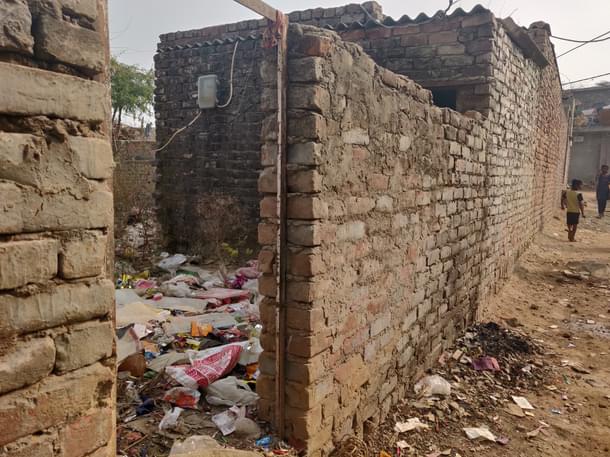
The narrow streets in the mohalla have open sewers, dumps of garbage every few metres, and an army of pigs rooting trash and dirt.
Yet, they prefer this to their ancestral village in Umerkot.
“Here, I can step out alone. My younger sisters go to school. We can worship our gods without fear,” said Imiya.
The father-daughter duo proceeded to show a temple they have built for themselves. It’s tiny – hardly three square feet – space created using bricks and stones, covered with a slab and a blue dupatta. There are portraits of Vishnu, Shiva and Lakshmi and of their community deity, Baba Rama Pir, neatly placed inside.
“They [Muslims] break idols of our deities there,” she said.
Kesro said his village in Umerkot, named Sawan Nakhrach Sarithi, is Hindu-dominated. Yet, they are persecuted by the tiny population of Muslims. “The government is theirs. The army is theirs. The courts are theirs. The police are theirs. You don’t find a single Hindu in the police. We don’t have a voice there,” he said.
The two were now joined by Imiya’s siblings and mother. They showed their school books, their self-embroidered blanket, their skills at kurta-stitching. “Everything is good here. Only, there is not enough work. Can you help us sell our blankets?” their mother said.
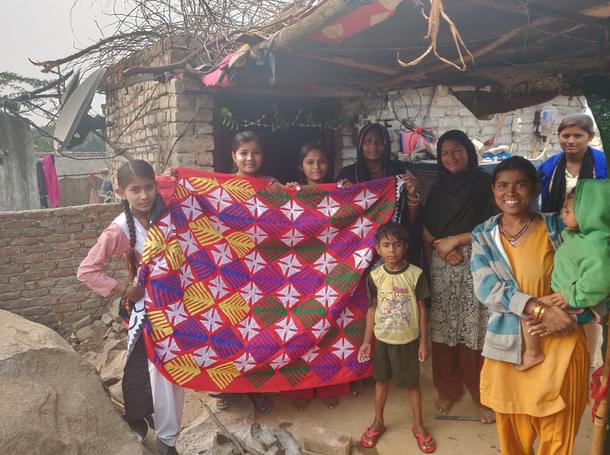
Two young men joined in. One of them, Santosh, got citizenship in 2017. He said he voted for the first time in general elections this year. He voted for the BJP.
A little better informed among his neighbours, Santosh said their 'leader' has called some media people in the evening for covering the celebrations.
“You have come early. You should have come in the evening,” he said, and turned to Kesro, “it is Amit Shah and Narendra Modi who did it.”
“Amit Shah zindabad. Narendra Modi zindabad,” said Kesro.
This article was first published in December 2019.
Swati Goel Sharma is a senior editor at Swarajya. She tweets at @swati_gs.





